IStock photo
Though there’s no evidence that any of those named Thursday in a report from three US House committees entitled: Fraud on ActBlue: How the Democrats’ Top Fund Raising Platform Opens the Door for Illegal Election Contributions in any way solicited the shadow donations, the revelation seems to point out the Democrat funding organization’s sloppiness in checking out donors – and recipients like Laura Kelly’s campaign – abundantly willing to accept money without question.
ActBlue is a national Politcal Action Committe and was founded in 2004, since becoming Democrats’ most major fundraising platform. Among other things, it primarly serves as an online conduit to process individual donations to candidates. Under federal law these contributions are considered individual donations and not PAC contributions.
The problem: Some of those individual donors listed by ActBlue – making in some cases tiny donations of a few dollars – say they’ve never donated to a candidate or would never donate to Democrats. Some say they aren’t political at all, yet their names pop up as ActBlue contributors.
The report listing Governor Kelly’s campaign isn’t the first scrape ActBlue’s been in. Republican members of Congress expressed alarm in 2024 that ActBlue wasn’t confirming credit or debit card donations made supposedly by individuals online with Card Verification Value (CVV) codes. ActBlue lobbied against a GOP-backed bill introduced in September 2024 that would require verification with CVV codes for political donations and likewise prohibit contributions with gift cards or prepaid cards which aren’t directly traceable to an individual.
Thursday’s report revealed ActBlue’s lack of commitment to fraud prevention through ActBlue internal memorandums shared with the committees.
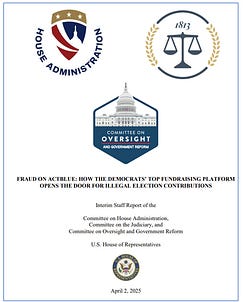
This interim staff report details the Committees’ troublesome preliminary findings. Internal documents produced to the Committees by ActBlue and its fraud-prevention contractor, Sift, demonstrate a lack of commitment to stopping fraud and paint a picture of complacency on ActBlue’s fraud-prevention team. Put simply, the documents reflect a fundamentally unserious approach to fraud prevention at ActBlue—one that has left the door open for large-scale fraud campaigns on Democrats’ top fundraising platform.
. . .
Rather than seeking to reduce or eliminate fraud on the platform, ActBlue’s chief fraud-prevention official was willing to accept 10 percent more fraud while he focused on DEI.
— Executive Summary, Fraud on ActBlue House report
ActBlue uses Sift, an “AI-powered fraud decisioning” platform, to assign a fraud likelihood score from 0 to 100 to most transactions. “Transactions with high Sift scores (indicating a high likelihood of fraud), from high-risk countries, or bearing other indicators of fraud may be flagged for automatic rejection or manual review.”
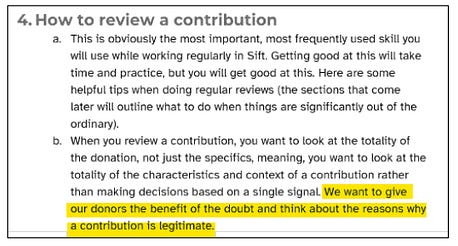
“Following Sift’s review, ActBlue automatically accepts 99.8 percent of donations.”
“ActBlue rejects significantly ‘less than 0.1 [percent] of all contributions’ for suspected fraud.”
22 significant fraud campaigns
Kansas Gov. Laura Kelly’s campaign was included in a list of “22 significant fraud campaigns.”
ActBlue’s apparent lack of interest in policing fraud is inexcusable on its own terms. But it is especially dangerous in light of the platform’s awareness that fraudulent actors have repeatedly sought to donate to Democrat campaigns and causes through ActBlue. With little more than a token fraud-prevention program, ActBlue has detected at least 22 wide-ranging domestic and foreign fraud campaigns pushing donations to candidates, campaign committees, and advocacy groups at every level of American politics. Most alarmingly, ActBlue has detected foreign fraud attempts emanating from Brazil, Colombia, Ecuador, India, Iraq, Jordan, Myanmar, the Philippines, and Saudi Arabia. The 22 fraud campaigns outlined in ActBlue internal documents show patterns of fraudulent donations to:
- Democratic National Committee (DNC)
- Governor Laura Kelly (D-KS)
- Representative Steven Horsford (D-NV)
- Representative Kevin Mullin (D-CA)
- Former U.S. Senate candidate Luke Mixon (D-LA)
- Former U.S. House candidate Audrey Denney (D-CA)
- Supervisor David Canepa (D-San Mateo County, CA)
- Mayor Erin Joyce (D-Braintree, MA)
- Councilor Kendra Hicks (D-Boston, MA)
- Alderman Justin Sawyer (D-Chicago, IL)
- Center for American Progress (CAP)
- National Association for the Advancement of Colored People (NAACP)
- The Ocean Agency
- Global Zero
- ChildFund International
- Courage California
- National Bail Out
- Vote Common Good
- Defund Apartheid Action
- Democratic Committee of Morris Plains (NJ)
- Volusia County Young Democrats (FL)
- Souderton Democrats (PA)
The Committees have no evidence that any of these candidates or entities solicited the fraudulent donations, though at least three campaigns did knowingly attempt to profit from them after being informed of their likely fraudulence. Internal documents indicate that the campaigns of Representative Kevin Mullin (D-CA), former U.S. Senate candidate Luke Mixon (D-LA), and Supervisor David Canepa (D-San Mateo County, CA), resisted when ActBlue asked them to return possible fraudulent donations.
Kelly’s “look out” details from ActBlue memorandums
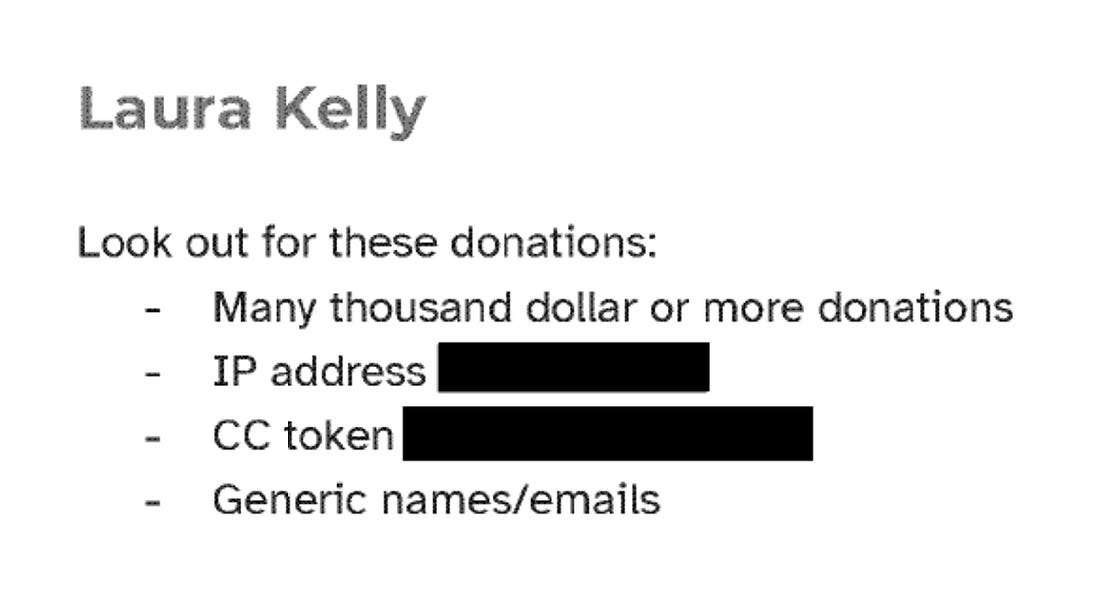

Gov. Kelly’s July 25, 2022 campaign finance report covers the June 8 to June 14 2022 date range listed above in the ActBlue memo. The Kelly report is 901 pages long.
June 8 contributions are on p. 243 and June 14 contributions are on p. 222. The report only identifies contributions types of “Check” and “Credit Card” — so the Act Blue contributions are likely “Credit Card.” It’s unclear how many of the reported contributions during that period might have been the subject of ActBlue’s concern.
Kelly’s report showed a monthly expense of $3023 to pay ActBlue credit card processing fees on July 7, 2022. With ActBlue transaction fees of 3.95%, Kelly’s campaign appears to have received about $76,500 in the month covering the dates of interest in the ActBlue memo. (Candidates must pay this credit card fee to avoid in-kind contributions from ActBlue, which in some cases would exceed contribution limits.)
Should Kansas adopt FEC-like ActBlue reporting?
ActBlue provides name, address, occupation, employer details for every dollar in FEC reports because of federal law.
Since Kansas has no laws about similar ActBlue reporting for state and local elections, there are no ActBlue reports to review that would cover Gov. Kelly’s ActBlue contributions.
The existing campaign finance reports often only show “efunds” as the source of a contribution, so the name of the money conduit is often not known with certainty.
FEC data is online and available in electronic form that can be analyzed using software. Kansas data extraction from PDFs is not always perfect and can be tedious to correct and analyze.
Comments from Gov. Kelly’s Office
Comments about this matter were solicited via email from Gov. Kelly’s office and her campaign. Neither would comment on the revelation, both referring to the other as the relevant source to address the issue.
Related
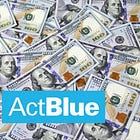 | Evidence of ActBlue contribution fraud in Kansas state and federal elections in 2020EARL F GLYNN·MAR 20Read full story |
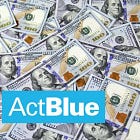 | ActBlue collected nearly $1 billion for Harris and Biden in 2024 election cycleEARL F GLYNN·NOVEMBER 3, 2024Read full story |
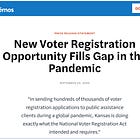 | Gov. Laura Kelly’s administration stonewalls new transparency requests about her actions in 2020 with thousands of voter registration formsEARL F GLYNN·SEPTEMBER 4, 2024Read full story |

Earl Glynn – Watchdog Lab
Earl F. Glynn is a mostly-retired data scientist, scientific programmer, software engineer and physical scientist living in the Kansas City metro area, and the publisher of the substack Watchdog Lab.




